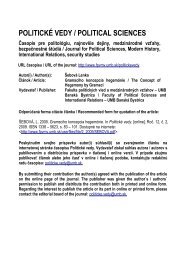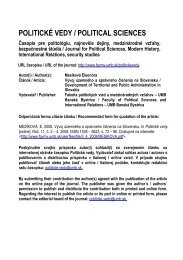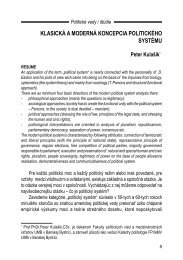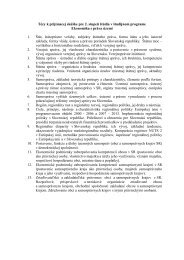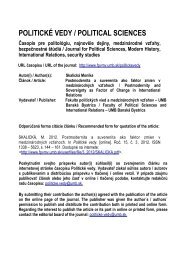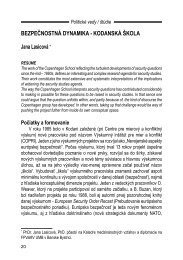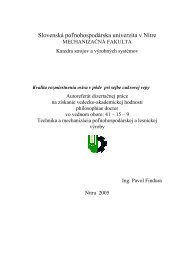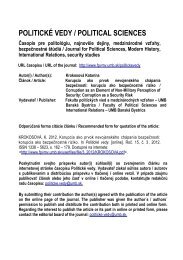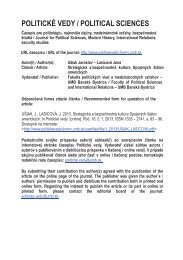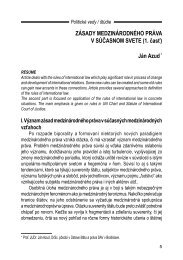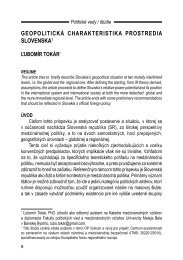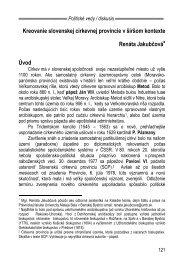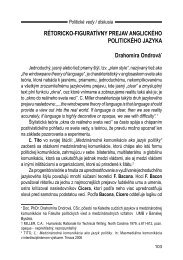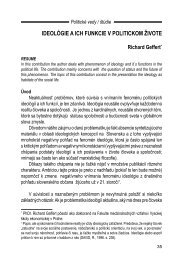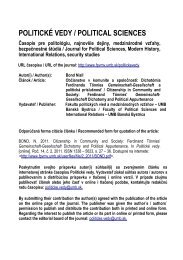MRAVNÃ VÃCHOVA V Å KOLÃCH NA SLOVENSKU A V ZAHRANI ÄÃ
MRAVNÃ VÃCHOVA V Å KOLÃCH NA SLOVENSKU A V ZAHRANI ÄÃ
MRAVNÃ VÃCHOVA V Å KOLÃCH NA SLOVENSKU A V ZAHRANI ÄÃ
Create successful ePaper yourself
Turn your PDF publications into a flip-book with our unique Google optimized e-Paper software.
have similar status in this document. This was the initiative of teachers who felt the necessity to<br />
emphasize the need to form pupils´moral character in a systematic and interesting way.<br />
The initiative is supported by the Civic union Etické fórum ČR, which provides for accredited courses<br />
of ethics within the programme of lifelong education of teachers. The seminars are focused on<br />
education to being pro-social according to R. Roche Olivar and L. Lencz. In cooperation with them as<br />
well as with the personal support of O. Križová and I. Podmanický Etické forum ČR has been<br />
organizing two-year courses, which have been attended by several hundreds of teachers and plenty of<br />
them have undertaken the initiative to teach the subject of ethics in their schools or to include its<br />
elements into related subjects and topics. It is evident that the introduction of the ethics as an<br />
approbation study area at university level within the teaching preparation for the first and second<br />
grades of primary and secondary schools should be the next step. In connection with this there is a lot<br />
to learn from our colleagues in Slovakia.<br />
Models of character education as variations to development of pupils´ character<br />
Naturally, restrictions can be justified as means of protection against socially pathologic phenomena.<br />
However, we are convinced that it is more effective and even more economical to apply such concepts<br />
of moral education that will develop moral character of the educated in a systematic and highly<br />
qualified way. Models of character education, which have been presented elsewhere and we would<br />
like to describe them briefly, can be used as a means of development of pupils´ character (Vacek,<br />
2006, 2008). In this context Blížkovský draws attention to the fact that “...process of character<br />
formation is more complicated, more synthetic and more complex than the process of education. Thus<br />
it is normal that within moral education we often find formalism, embarrassment and helplessness”<br />
(1992, s. 160). And that is why complexity, coherence, interrelation and high involvement of majority<br />
of teaching stuff are typical for the offered models.<br />
The first is the model of T. Lickona. Lickona perceives the substance of “good character” as harmony<br />
of three basic elements. These are moral knowing (consciousness), moral feeling and moral acting<br />
(Lickona, 1992, Vacek, 2006). In practice it means that those who are able to address the reason and<br />
feelings of children and to direct their activity in a suitable way will be successful in moral education.<br />
According to Lickona it is the 3H model (head, heart and hands).<br />
In terms of education of “good character” in schools Lickona chooses the so-called twelve strategies<br />
(nine of them are classroom-based and three of them are performed within the whole school):<br />
In the classroom teachers should: 1) Act as protectors/caretakers, advisors and they should provide<br />
pupils with examples encouraging their pro-social behaviour and at the same time regulating their<br />
inappropriate behaviour. According to Lickona teachers´ personality has the most important role in<br />
formation of pupils´ character. He emphasizes the importance of the mutually good quality<br />
relationship between teacher and pupil. 2) Create moral fellowships in the classroom. Help pupils<br />
(students) know and respect each other, help each other and feel like fully-fledged members of the<br />
class. 3) Practice discipline based on creation and application of rules (standards) as a means of<br />
development of moral reasoning, self-control and respect towards other people. 4) Create democratic<br />
environment in the classroom, where pupils have opportunities to participate in decision-making and<br />
to be responsible for making the classroom a pleasant place to live, learn and work. 5) Teach values<br />
within the curriculum. Use the contents of the subject as a means of research of ethical issues. 6) Use<br />
cooperative teaching for development of abilities and habits to help others and cooperate in team. 7)<br />
Develop the need to “do well” by encouraging responsibility for pupils´ own performance and by<br />
supporting their relationship to values of education and work. 8) Provoke moral reflection via reading,<br />
writing, discussing, debating and practicing of making right decisions. 9) Teach pupils and students to<br />
find just and non-violent solutions of conflicts.<br />
Within the whole school following strategies are recommended: 10) Provoke and encourage useful<br />
and helpful activities of pupils and students outside the classroom and school with the use of models<br />
and opportunities provided by school or local (regional) community. 11) Create positive moral culture<br />
in school ranging from the school management, morally correct relationships among teachers and<br />
304



